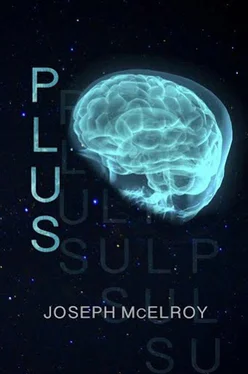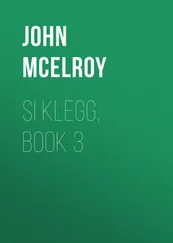Re-entry window narrow.
Recovery area no longer secure. Stabilize, please, Imp Plus. Countdown to manual stabilization. A ripple up the memory of a spine.
Cap Com confused secure with secret . Words dispersed. Imp Plus heard the future tuning the past as the Earth fell toward him. Others tried to reach him. But the chance of angles that would neither bring IMP in nor burn it up, but carom it off along a long clarity of sliding space to be chased by interceptors whose own contingency launch plans at this moment were riding at their own mad cost into position — this came to Imp Plus not from all the others trying to reach him to get him and see him, but from the Acrid particles that knew so much — knew what was then suddenly shared up the spine of their private beam in Imp Plus’s thought that he would not be a bone of contention.
Cap Com vouchsafed the new Contingency Mode.
But the Acrid Voice had intervened; and in this brief break the words that went through the lattice wheeled as if to pass on by reflection to the Sun — seeking a future. Sought it in two foci drawing between them from past to future a memory of Imp Plus.
It was the radiation sickness. It had found and been a window to reverse itself. Reverse what had always happened: what should happen: for ionizing radiation rams out electrons, wrecks molecules, switches their cells which die.
But cascade had been turned around.
The radiant poison found its host potioned how? So its host was able — how? — to chase parts from particles, cadence from decay, to grasp a dispersion that was always breathing contagious divisions into loci that then freed contagion to multiply its touch.
So this had been the other sun. Imp Plus’s sun. Escaped from the very radiation that had escaped into him, flooded him.
KEEP IN CONTACT IMP PLUS. PLEASE CONTACT GROUND.
Words came also from the Acrid particles: beta emitted from carbon-14, calcium-45, strontium-90; gamma slowing to attach to an atom; radio-isotope tracers in the blood; fences flowing through blood: words from the Acrid particles bombarded one slope of the lattice layers finding there one small and signal orbit now lessening: and as it lessened, this orbit that had been Imp Plus gave off into the Sun feelings that were their own response: the Sunbraids had glanced wildly, had they not? were a wonder, were they not?
But to the Acrid particles went other questions: the Sunbraids had joined out of desire and bleeding anguish broken by blood’s absence — out of a breathtaking inclination between their spiral and the crimson memory of the future: did this all go out the window with the water, glucose, semi-conductor volts, and the dissolving and reconstituting swirls and milks of particles?
To the lessening orbit in one slope of the lattice layers came an answer from the Acrid particles: that is, questions fed back by what (alone with the Acrid Voice) Imp Plus (before he had been Imp Plus) had almost known once in a small green room like an idea:
Reciprocal focusing — yes, reciprocal focusing on what was not there: namely, the Other: which was the absence-to-be of Imp Plus’s body.
But what focus (asked now the Acrid particles) had turned radiation’s breath out of poison into seed? how had the speed of this contaminant light wound to itself such streams of photons from the Sun? but now what focus (for, having stood up and looked down at white data blinking on a green screen, the Acrid Voice felt in his height a shadow of annihilation recede into recent memory), what focus had drawn their minds so close — so close to fusion?
Down into the cloudy shell of Earth on the main frequency went the words THOUGHT FELT LIKE IT, and if such words went from the great lattice which now stabilized the IMP, the words passed on Earth as those of Imp Plus.
The same voice — it equalled its clear words — answered Cap Com’s transmission DO YOU HAVE POWER (that came twice again — a past blankly out to refract a future) DO YOU HAVE POWER?
YES AND NO.
But to the Acrid ovals pierced by static from Cap Com’s grasshopper elbows on an island in the Pacific came a power raised to wholeness, raised by camouflage that was not other than the words the Acrid particles alone received now: Have they power to intercept a deep-space trajectory?
Answers swarmed the lattice, but whether from the Acrid friendly Voice on the island or from the questioner in narrowing orbits could not be told.
The questioner? His name had gone, he was still he, he swarmed with answers and doubts. He foresaw a fiery carom, he saw his own IMP containing the lattice like a planar field step into space so deep its garden of foci grew an endless orbit stranded helically of helium and positrons — and he was drawn by this chance until he saw that it really was his if he wanted. But then he thought of the Acrid particles on the island below and thought that what he and they had together drawn into a circuit of conception could best hold elliptically distinct if he became an absence.
The IMP must hit Earth’s outer atmosphere neither to skip off into space nor trick the fire of those first frictions and slip through to recovery in the sea airs of the Pacific.
The lattice dipped pale and still and contained what it yet might not wholly have: an idea of itself: itself not wholly self-possessed, for a power of it beamed to and fro from Earth, a line-thin loop of particles so fine they gave back sight to the Sun.
Into the Acrid ovalling particles on the Pacific island came a power raised to wholeness by camouflage: camouflage not other than the dim, distinct transmission from space, as from the open center of an idea: No desire to carom into space, no desire for re-entry: camouflage received by the ovalling particles like the breath of thought: thought knowing that the hot crash of what was broadcast as re-entry static was not re-entry — the IMP had burned up in the first friction of the atmosphere: thought wondering then what chances now turned upon this fresh absence that would be as lasting as the glint of its arrival must have been brief for any who saw it in the sky: thought wondering, too, if at the last the great lattice had let this happen or had been surprised.
Joseph McElroy is the author of nine novels— A Smuggler’s Bible, Hind’s Kidnap, Ancient History: A Paraphase, Lookout Cartridge, Plus, Women and Men, The Letter Left to Me, Actress in the House, Cannonball . Also two novellas, Preparations for Search and Taken From Him (available as a Kindle Single), and a volume of short fiction, Night Soul and Other Stories (Dalkey). A volume of McElroy’s essays, Exponential , has been published in Italy and in expanded form will be forthcoming as an e-book from Dzanc. A long-in-progress nonfiction book about water is near completion. Three short plays are forthcoming, and a children’s book. McElroy received the Award in Literature from the American Academy of Arts and Letters and fellowships from the Guggenheim, Rockefeller, and D.H. Lawrence Foundations, twice from Ingram Merrill and twice from the National Endowment for the Arts. He has taught at Johns Hopkins, Columbia, Northwestern, CUNY, and other universities. Born in Brooklyn, New York in 1930, McElroy was educated at Williams College and Columbia University. Further information at www.josephmcelroy.com.
Sarah Gridley is an associate professor of English at Case Western Reserve University in Cleveland, Ohio. She is the author of three books of poetry: Weather Eye Open (University of California Press, 2005) Green is the Orator (University of California Press, 2010), and Loom (Omnidawn Publishing, 2013).












